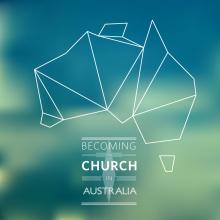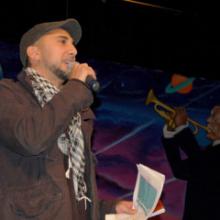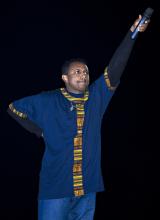Activism

I was among millions across the globe wrapped up in the glee of Pharrel William’s song, “Happy.” I first heard it while watching Despicable Me 2 with my family last year. As the credits rolled I remember making a mental note to add it to my workout playlist.
Pharrel even released a 24-hour video of the song on YouTube for millions to enjoy globally – creating a sort of time released happy capsule that was just a click away.
I thought about how this “Happy” anthem struck a chord in our world’s collective unconscious. “Could it be a sign that all of us, the human family, crave deeper joy and some levity?”
I think faith-based communities can discuss this for years to come at a time where joy is a necessity more than a luxury, and ministers are flaming out quicker than ever, and according to a New York Times article, suffer from depression “at rates higher than most Americans.”
Maintaining a sense of joy is then vital for my own work, especially since I lean toward New York-bred cynicism and incredulity. Activism can be rewarding, yet also extremely discouraging at times. Change can seem incremental at best, and the issues are much bigger than any one person or institution can handle. Making joy a vital ingredient in the active life of faith, within the soul of activity.
I’ve been considering three approaches in cultivating joy, a God-given, buoyant energy, in the midst of some weighty work.


Jeju Island, South Korea — For the past two weeks, I’ve been in the Republic of Korea (ROK), as a guest of peace activists living in Gangjeong Village on ROK’s Jeju Island. Gangjeong is one of the ROK’s smallest villages, yet activists here, in their struggle against the construction of a massive naval base, have inspired people around the world.
Since 2007, activists have risked arrests, imprisonment, heavy fines, and wildly excessive use of police force to resist the desecration caused as mega-corporations like Samsung and Daelim build a base to accommodate U.S. nuclear-powered aircraft carriers and submarines for their missions throughout Asia. The base fits the regional needs of the U.S. for a maritime military outpost that would enable it to continue developing its Asia Pivot strategy, gradually building towards and in the process provoking superpower conflict with China.
“We don’t need this base,” says Bishop Kang, a Catholic prelate who vigorously supports the opposition.

Here’s a crash course to understand what’s happening in Australia with refugees and the politics of Jesus.
Imagine for a moment that in the lead up to the next U.S. elections, a political party changed immigration policies and took the relatively small number of people seeking safety on boats from, let’s say Cuba, and locked these persecuted people up on Guantanamo like criminals — elderly, men, women, and over 1,000 children. You would expect outcry from people across the political spectrum. Indeed there was. Only the fear campaign was so effective, the blame game so seductive and the election win so decisive, that the majority of politicians on all sides sacrificed their principles on the altar of popularity. Not to mention these desperate people — tired, poor, huddled masses yearning to breathe free — … these now homeless who were literally tempest-tossed on boats sacrificed on this bloody idol of false security. Of course behind closed doors, elected officials will confess to you, as a Christian, that they personally find it abhorrent but for the sake of the party and all the good they could do when they get into power they rationalize with the logic of Caiaphas and get the same results: the sacrifice of the innocent.
Sound too far-fetched? This is the recent history of Australia. Thanks, Paul Dyson, for the Cuba analogy.

For me, action had become a way to look good and gain respect — but it obscured the more important inner work. It anesthetized the throbbing nerves of my aching interiority. And I needed it because my insides were bleeding so bad and hurting so raw from so many years of neglect that if I allowed myself to get off the action pill, it might just all catch up with me. An addiction to avoidance sanctioned by the church. Radical ruptures, indeed.
What I have asked myself in the days since those passionate experiences have left deafness and dryness in their wake is about the hard work of the Kingdom that has nothing to do with revolutionary activism. What about the work that is only done in the privacy of the human heart? Where are the voices encouraging people that they indeed can hear God speak within them — and that that is the Voice for which they ought to be straining? In all my followings, I rarely encountered a Christian leader who dared to enact Augustine's famous words and turn the Truth loose, trusting that it will defend itself.



One sort of Christian believes taking Eucharist weekly saves her. Another Christian believes his confession of Jesus Christ as Lord saves him. Still another looks to his Baptism. Another to her participation in the body of Christ. One to his repentance. And another to her care for the sick, the hungry, the prisoner, and the poor.
We elevate one belief or practice over another, then divide ourselves as Christ followers by the priority we set when, in fact, all of these are taught as saving by Christ, who alone is our salvation.
Christ saves me, not the accuracy and purity of my beliefs. Christ saves me, not my works. Christ saves me, not the measure of my adherence to a doctrine or practice.
When all is said and done, many Christians tend to look to their habits, their faith, and their perseverance when it comes to salvation rather than to the work, belief, and faithfulness of Christ in us, over us, under us, and through us.

I MET MARKKU and Leah Kostamo of A Rocha, an international Christian environmental organization, on the set of a television show in Toronto. The show was Context, hosted by the welcoming Lorna Dueck. This show explores the stories behind the news from a frankly Christian viewpoint.
I had been invited to talk with Dueck about my MaddAddam future-time book trilogy, and in particular about characters in the second book, The Year of the Flood, called the “God’s Gardeners,” a green religious group that raises vegetables and bees on flat rooftops in slums. It is headed by a man called Adam One and includes a number of ex-scientists and ex-doctors who have withdrawn from a too powerful, greedy corporate world in which they can no longer function ethically. The God’s Gardeners group represents the position—probably true—that if the physical world is going to remain possible for human life, religious movements of many kinds will be an important element. We don’t save what we don’t love, and we don’t make sacrifices unless “called” in some way to make them by what AA refers to as “a higher authority.”
Dueck and I talked a little about that, and then—surprise—right before me were two people who closely resembled the God’s Gardeners of my fiction. Leah and Markku Kostamo are walking the God’s Gardeners walk—through A Rocha, a hands-on creation-care organization. A Rocha’s origins go back to the Christian Bird Observatory (cf. St. Francis) founded on the coast of Portugal by Peter and Miranda Harris in 1983. Leah met the Harrises in 1996 when she took a class they were teaching at Regent College in Vancouver, British Columbia, and A Rocha Canada was born. It was soon augmented by Markku, an environmental scientist. A Rocha is now running 20 projects around the globe, engaged in everything from habitat restoration to organic community farming.

CHICAGO — Religious affiliation may be on the wane in America, a recent Pew study asserts, but you wouldn’t know it walking into the storefront near the corner of West 63rd Street and South Fairfield Avenue.
Inside a former bank in a neighborhood afflicted with gang violence, failed businesses and empty lots, a team of volunteers drawn by their religious faith is working to make life better for Chicago’s poorest residents.
The free medical clinic has expanded its hours; 20-something college graduates are clamoring to get into its internship program; rap stars swing by its alcohol-free poetry slams; and the budget has increased tenfold in the past decade.
The storefront belongs to Chicago’s Inner-City Muslim Action Network (IMAN) and it is part of a wave of new Muslim institutions emerging at an unprecedented pace. More than a quarter of the nation’s 2,106 mosques were founded in the last decade, according to a recent University of Kentucky study, and new social service organizations, many of them run by 20- and 30-something American-born Muslims, are thriving as never before.

God Girl's New Favorite Thing for Oct. 12, 2012:
Ethiopian Pop StarTeddy Afro
ADDIS ABABA — Pretty much everywhere we've gone in Ethiopia this week, we've heard Teddy Afro's voice.
The 36-year-old Ethiopian singer whose given name is Tewodros Kassahun or ቴዎድሮስ ካሳሁን in Amharic, the national language of Ethiopia, is sometimes referred to as the "Michael Jackson of Ethiopia." But, to my ear at least, he's more the equivalent of, say, Ethiopia's Usher (if he were more political, that is.)
Afro's debut album, 2001's Abugida, spawned several hit singles, including "Halie Selassie" (his tribute to the late Emperor of Ethiopia Haile Selassie I), and "Haile, Haile," which honored Ethiopian Olympic runner Haile Gebrselassie.
This week I came across a dynamic outlet for new forms of storytelling. MAKERS is a documentary project where dozens of short reflections and dreams are gathered to promote the ways a diverse collection of women are transforming the planet into a more holistic and habitable place. While most of these stories are non-fictional, rooted in a place that may not extend too far beyond their origins, the opportunity to zoom in on an impassioned way of living, thinking, and acting, is an encouragement for all people to continue acting out the worlds we desire. These many narratives of change and engagement craft a large and resounding story of the power of women.


In a video address Tuesday, President Obama told hundreds of young evangelical Christian leaders gathered at the Q Conference in Washington, D.C., that they had a partner in the White House in their humanitarian and social justice efforts.

The huge throng filled the entire Square and was reminiscent of the historic mass mobilizations in February that brought down the Mubarak dictatorship. The rally was announced as a ‘million man march’ and was backed of a broad cross section of Egyptian activist groups, from liberal secularists to conservative Islamists. The Muslim Brotherhood did not support the march, although many of its youth members joined the crowd. The rally had a positive and hopeful spirit, in sharp contrast to the earlier violent clashes, which we witnessed on November 20.
The atmosphere in the Square on Friday was almost festive. We saw families with children, vendors selling food and drinks, face-painting on children (and thanks to a group of laughing teenagers, painted hands) and everywhere we saw the red, white, and black stripes of the Egyptian flag. It was a diverse crowd, young and old, women and men, middle class and the very poor. We were welcomed and greeted warmly by many.
The crowd was friendly but determined in its commitment to fulfill the promise of the revolution. There were no speeches, but constant chanting rose from groups throughout the Square, all with a similar message: Military rule must end.
Rainey is quite a woman. Reared in Nazi-era Germany, she is well known around her adopted city of Seattle for her years of social justice activism. According to the Post-Intelligencer, Rainey even ran for mayor briefly in 2009, and was on her way to attend a city transportation department meeting when, as she was changing buses, she heard a swarm of helicopters over head, figured there was an Occupy demonstration near by and went to investigate.
Whether you agree with the ideology of the Occupy movement or not, Rainey is an inspiration. In an interview last week with Keith Olbermann, the octogenarian activist said that she was energized by the pepper spraying incident and went on to give a shout out to the late Roman Catholic nun, Jackie Hudson (also a life-long peace activist who was arrested several times for protesting at nuclear arms sites), for inspiring her to keep fighting the good fight, even in the winter years of her life.
Rainey recalled Hudson's words of inspiration: "Whatever you do, take one more step out of your comfort zone."

All of my life, religious sisters have had a special place in my heart and imagination.
I love nuns. LOVE them.
So a story in today's New York Times caught my eye (and my heart) immediately when I saw the headline: "Sisters of St. Francis, Quiet Shareholder Activists" and then the even-better headline on the story's web page at NYT.com: "Nuns Who Won't Stop Nudging."
President’s Obama’s delay in approving the Keystone XL Pipeline is a victory for the movement to stop it, for God’s earth, for the possibility of reversing climate change, and for saving the integrity of this administration.
A “No” to pipeline approval wasn’t really politically likely, with the likelihood of attacks on Obama by the Republicans and the labor movement of sacrificing jobs during an election year — even though the pipeline offers temporary and bad jobs.
The environmental movement is part of the Democratic President’s base, but so is labor and they are both more numerous and more effectively organized to help in presidential races.
So this delay is a victory for the possible future of a clean energy economy, which would produce many more and better jobs, while making a cleaner and more sustainable economy possible.

You need to read God in a Brothel because:
- 30 million people are enslaved around the world,
- It’s a $32 billion industry per year,
- 2 million children are enslaved in the sex trafficking industry,
- 100,000 of these children are living right here, in the United States.
The sex trafficking industry would not exist without the demand for commercial sex that flourishes worldwide.
The church played a central role in the Civil Rights and anti-apartheid movements. Now the church has the power -- and the responsibility -- to fight human trafficking with all of its rich resources.